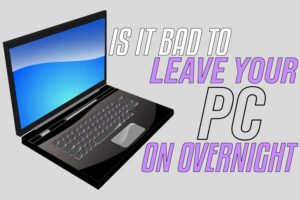
Whether to leave your PC on overnight is right has been a question for debate over the years. However, the answers vary because of immense changes in technology, plus people use PC for different purposes.
Today the answer is more of personal choice and the user’s habit. Some leave the PC on overnight to install software, download a file, etc.
All in all, you must leave the PC on from time to time. If it has grown into a habit, then you might be wondering whether it is the right thing to do. So let’s find out.
Is It Bad to Leave Your PC on Overnight
It is perfectly okay to leave the PC on overnight. The machines can handle a lot and will undoubtedly shut down in case of overheating. Plus, most PCs only overheat if misused. The only thing you need to worry about is the electricity bill.
Additional Information
Overall it depends on how often you use the PC. For example, if you use the PC multiple times a day, you should leave it on.
Contrarily if you use the PC for some hours, like one or two hours, then it’ll be best if you turn it off overnight.
Leaving the computer on overnight is less stressful if you can quickly access it. Turning on the computer causes a small power surge when things spin up. Therefore turning it on severally in a day shortens its lifespan.
The risk of leaving the computer overnight is much worse in old computers. They pack the old hard disk drive, which has moving parts.
The mechanical parts will surely fail after some time. Plus, constantly using them undoubtedly wears them down. In addition, computers tend to heat when on, which can affect specific components.
You should note that specific PC components have a limited life cycle. For example, if you leave the LCD panel on all the time, it can only last for 15,000 hours or approximately two years.
It’s better to let the panel time out and automatically shut down when not used. The other PC components with a limited life cycle are the battery and hard drive. Turning the PC off will extend the components’ life.
Why Do People Leave Their PCs on Overnight?
There are several varying reasons why people leave the PCs on overnight. It is not only about starting it quicker, but it also enhances its functionality.
Convenience
The main reason for leaving the PC on is convenience since you won’t wait for it to boot. The typical system that has an SSD takes about 30 seconds to boot into the operating system.
The older machine with a hard drive will take up to one minute or more. If the PC has several programs that have to launch on boot, the PC will undoubtedly take longer.
Leaving your PC on will help you avoid such issues. The PC will only take a couple of seconds to awaken from sleep mode, and the launched apps will still be running.
You, Will, Have Access to the PC All Time
If the computer is on overnight, you will efficiently run certain software pieces that would be off-limits when it’s off. It includes software like remote desktop found in windows.
You won’t experience the frustration of forgetting essential files on your desktop at home. It’s because you’ll be able to remotely access your computer through your table, phone, or work computer at any time.
Ensures The Computer Is Up To Date
Several tasks are crucial in ensuring your computer is functioning effectively and efficiently.
It’s better if the PC performs the tasks overnight. Creating backups, installing the operating system, running virus scans, etc., need varying amounts of bandwidth and resources.
Allowing them to run at night without interfering with your schedule will keep the computer entirely updated.
Downloading Files
The gamers can surely relate to this because of the gaming files size. The gaming files get bigger each time a new game is released or a software update.
You can’t choose to wait for an 80GB file to download or update. Doing the updates at night will offer you convenience. Plus, the downloading and updating task is not particularly demanding.
Leaving the PC on overnight to download any file won’t stress it or consume much power. You will find a complete download that you can open and immediately play in the morning.
Rendering
Those who have tried rendering a video can surely relate to this. The computer takes much time to finish this task. Plus, the laptop is usually unusable when rendering the video, and you can’t do any other jobs.
Therefore rendering at night will be convenient. All you need to do is leave the computer on to do the task. It will be more convenient if you have lots of work to do during the day.
You will be more productive and have extra time for the critical tasks. However, you should note that the computer heats up during rendering.
If your computer is prone to overheating and has dust issues, you need to sort them out before leaving the PC to render videos overnight.
Cons Of Leaving The PC On Overnight
Wastes Electricity
The PCs are usually down the clock to save power. It will still use power, and it can quickly add up if it constantly does heavy tasks overnight. To lower your power bill, you can turn off the PC.
Reduced Lifespan
The primary issue with leaving your PC on overnight is reduced lifespan. The other factors that reduce the PC’s lifespan are ineffective cooling systems and dust build-up.
The motherboard can take about ten years, but it will significantly reduce if you leave your PC on overnight or all the time.
The monitor is the PC component that is greatly affected, but you can always turn it off. On the other hand, the SSD usually has a limited lifespan and can fail sooner than you expect. However, your PC’s lifespan depends on how well you maintain the PC.
Power Surges
People are pretty familiar with power surges caused by lightning strikes etc. However, power surges can happen at any time in your home.
However, if you plug your PC into a surge protector, you don’t have to worry about power surges.
Therefore you can protect the PC from power fluctuations by turning it off. It will also help improve your PC’s lifespan.
Affects The PC’s Performance
However, this issue is common in old computers. In the days’ regular reboots were crucial for the computer’s life. It prevented the machine from going to a halt.
The good thing is that it’s no longer an issue in modern computers. The current operating systems are pretty responsive and quick at managing resources.
If you choose to leave the PC on overnight, you won’t notice much difference in the performance. However, rebooting is still tremendous and an effective way of solving daily errors.
It can be a crushing application or a printer not working; a quick restart will solve the issue. Turning off the computer will flush the system and ensure it starts fresh; it starts bug-free at times.
It’s Noisy
When the PC is on, it’s possible to silence the notifications and alerts, but you will hear ambient noise from the clicking hard drive and fan.
Therefore people choose to turn off the computer to keep the house, room, or space quieter.
Taking Care Of Your PC
Yearly, millions of PC spoil and end up in the scrap heap. You can, however, squeeze extra life from your PC by simply taking care of it. The one way to ensure your PC is safe is by always using a surge protector.
It will offer additional and emergency power to prevent power spikes that low the lifespan of specific PC components. It would be best to clean your PC regularly to ensure it runs excellent.
Cleaning the PC is straightforward: open the case and blow out debris or dust using canned air. In addition to physical cleaning, you can also keep the hard drive clean by deleting unused idle files and software.
Understanding Different Modes And Processes
Sleep Mode
If you put the computer into sleep mode, it means the computer stores open applications and files in the computer’s RAM. All other components such as the monitor and CPU will shift to low power mode.
Shutdown Mode
All the active programs and applications on your PC will stop in this mode since the computer won’t be powering the components.
Hibernate Mode
The computers have hibernated mode; they copy active applications and files to the main hard drive memory.
It also ceases power to all the PC components. The mode is best when you plan not to use your PC for one or two days.
Conclusion
If you usually use the computer more than once a day, you can leave it on overnight.
If you use it only for some hours in a day, you should turn it off when you finish doing all the activities.
However, everyone has a unique situation. It’s your ultimate usage that determines whether to leave your computer on overnight or not.








